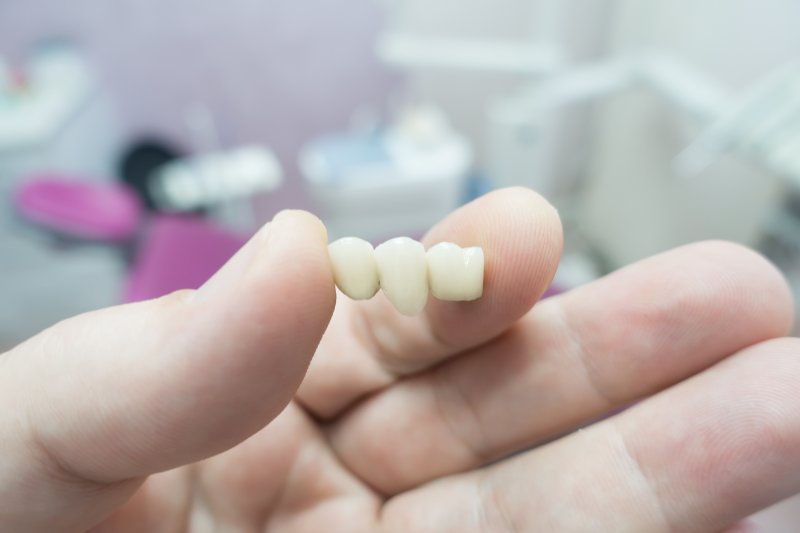
Dental bridges often work for a long time, with many enduring for fifteen years or more. That said, these devices can also fail early when they don’t get regular care. If you want your own dental bridge to last, you’ll need to be careful and look after it properly. The good news is your Topeka dentist is here to ensure that happens. So, keep reading to learn what can make dental bridges fail and how to keep them working.
What Can Make Dental Bridges Fail?
Dental bridge failure can occur for various reasons, but the most common ones are:
A Badly-Constructed Bridge
Don’t simply assume your own actions made a bridge fail. Sometimes, the device can stop working because it wasn’t well-made.
You see, a badly constructed dental bridge will often fail early. Such a prosthetic uses low-quality materials, so it can’t endure the force from chewing as well as stronger restorations can. That weakness (as well as a poor fit) will make a bridge stop working earlier than it should.
An Unclean Mouth
Dental bridges may not be “natural,” but they still depend on good oral health. An unclean mouth will often cause them to fail early.
Note that dental bridges rely on nearby natural teeth. When those “abutments” get cavities or infections, they become unstable and can’t support prosthetics well. The result is that a dental bridge will quickly start to slip and fall out of your mouth.
Poor Oral Habits
Your poor oral habits won’t just affect your “real” teeth. If taken too far, these practices will cause a dental bridge to fail earlier than usual.
Dental bridges aren’t durable enough to handle everything. When put under excessive pressure, they can slowly fracture and break apart. That means bad habits like nail biting and teeth grinding are extra risky for your prosthetics. If you don’t give them up, they could trigger a dental bridge failure.
Tips on Caring for Dental Bridges
You can do several things to help your dental bridge last. These include the following:
- Quit Bad Habits – Quit your bad oral habits (if any) and replace them with good ones. That way, your dental bridge will face less pressure.
- Practice Good Oral Hygiene – If you brush twice daily and floss once daily, the teeth supporting your dental bridge will be strong.
- See Your Dentist Often – When you attend frequent dental checkups, your dentist can identify and address threats to your dental bridge.
Please consult your dental provider about other threats to dental bridges. With their input, you can keep your restored smile safe!
About the Practice
Michel Dental is based in Topeka, KS. Led by Drs. Michael E. Michel and Michael Weber, our practice strives to give every patient a truly flourishing smile. We thus tailor our preventive, cosmetic, and restorative treatments to your mouth’s needs, ensuring you get the best results possible. Our team is also ready and able to treat dental emergencies as needed. For more details or to book a visit, please contact us on our website and by phone at (785)-273-0801.
